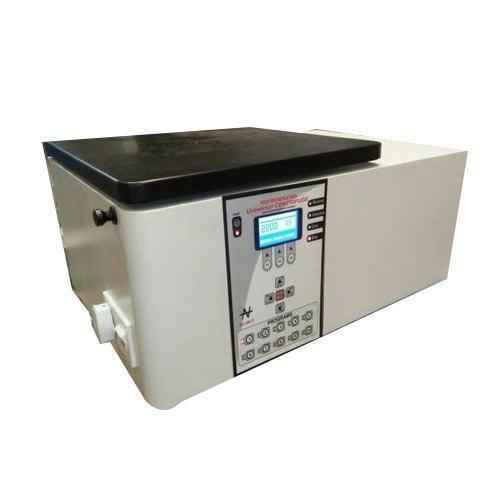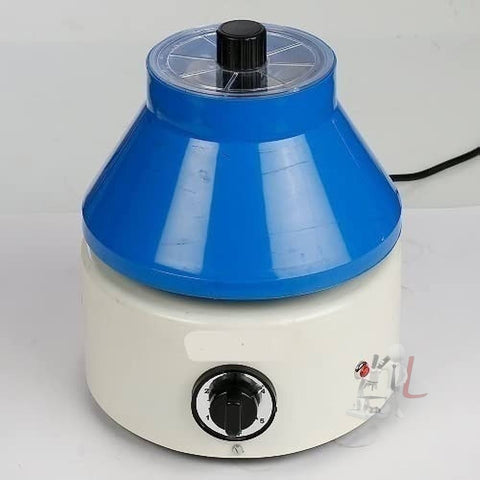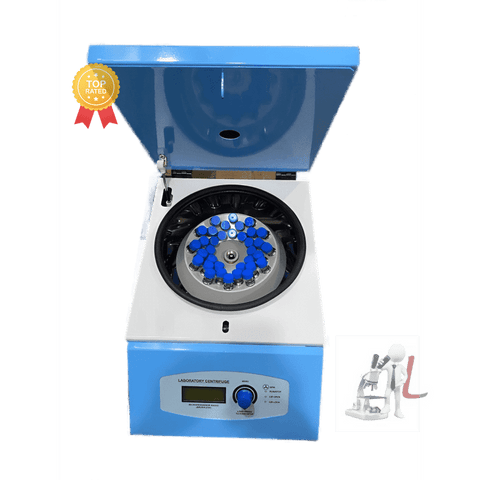Centrifuge Machine: How It Works and Its Applications

Centrifuge Machine
A centrifuge machine is an essential piece of equipment widely used in laboratories, industrial processes, and medical settings. It operates on the principle of centrifugal force to separate components of different densities, making it invaluable in various applications such as chemistry, biology, and medicine. The working principle of a centrifuge involves spinning samples at high speeds, which creates a force that pushes denser materials to the bottom of a container while lighter components rise to the top. This basic function simplifies processes to isolate and purify substances.
What is a lab centrifuge machine?
A lab centrifuge machine is a vital piece of equipment used in scientific and medical laboratories. It is designed to separate substances of different densities by spinning them at high speeds. This process is known as centrifugation and is used for various applications, including separating blood components, isolating DNA, and purifying proteins.

Why are lab centrifuge machine specifications important?
Lab centrifuge machine specifications play a crucial role in determining the machine's performance and suitability for specific applications. Understanding these specifications is essential for scientists and researchers to ensure accurate and reliable results.

What are the key specifications to consider?
1. Speed: The maximum rotational speed of the centrifuge, measured in revolutions per minute (RPM). Higher speeds are generally required for applications involving smaller particles or substances with a higher density.
2. Capacity: The maximum volume or weight of samples that the centrifuge can accommodate. It is important to choose a machine with a capacity suitable for the intended application.
3. Rotor Types: Different rotors are designed for specific applications. Common types include fixed-angle rotors, swinging bucket rotors, and vertical rotors. Each type has its advantages and limitations.
4. Temperature Control: Some centrifuges offer temperature control capabilities, allowing researchers to perform experiments at specific temperatures. This is crucial for applications that require precise temperature control, such as enzyme assays or cell culture.
5. Acceleration and Deceleration Profiles: The centrifuge's ability to start and stop smoothly without causing sample disturbance or damage. Gentle acceleration and deceleration profiles are important for fragile samples.
How do lab centrifuge machine specifications impact results?
The specifications of a lab centrifuge machine directly affect the quality and reliability of the results obtained. Using a centrifuge with inadequate specifications may lead to incomplete separation, sample damage, or inaccurate measurements. For example, if a centrifuge does not reach the required speed, particles may not separate effectively, leading to compromised results.
Choosing the right lab centrifuge machine
When selecting a lab centrifuge machine, it is crucial to consider the specific requirements of the intended applications. By carefully evaluating the machine's specifications, researchers can ensure optimal performance and accurate results.
In conclusion
Lab centrifuge machine specifications are vital for achieving accurate and reliable results in scientific and medical laboratories. By understanding and considering these specifications, researchers can select the most suitable centrifuge for their specific applications, ensuring optimal performance and successful experiments
The lab centrifuge machine is a crucial tool designed to expedite the process of separating components in samples. Its rapid spinning motion creates centrifugal force, leading to the separation of substances based on their density. With precise control over speed and time, this equipment offers researchers and scientists the ability to isolate specific components for further analysis. Whether it's in medical, biological, or chemical laboratories, this versatile machine plays a vital role in enhancing research efficiency and accuracy. Invest in a lab centrifuge machine to elevate your laboratory's capabilities and accelerate scientific discoveries.additionally, the lab centrifuge machine comes in various types to cater to different research needs. Microcentrifuges are perfect for small sample volumes, while high-speed or ultracentrifuges are ideal for larger volumes and ultra-high-speed applications. Refrigerated centrifuges provide the advantage of maintaining temperature-sensitive samples at a controlled temperature during the separation process.
These machines offer user-friendly interfaces, making them easy to operate even for those with minimal experience. Safety features such as lid interlocks and imbalance detection ensure secure and trouble-free operation.
In the field of medicine, the lab centrifuge is commonly used for tasks like isolating plasma or serum from blood samples, conducting viral load tests, and separating DNA for genetic analysis. In molecular biology, it aids in purifying nucleic acids and proteins. In industrial applications, centrifuges play a significant role in the pharmaceutical, biotechnology, and chemical industries, where the separation of different components is vital for product development and quality control.
When selecting a lab centrifuge machine, consider factors like maximum speed, rotor options, capacity, and programmable settings to ensure it aligns with your specific research requirements.
Investing in a high-quality lab centrifuge machine will undoubtedly boost the productivity and accuracy of your laboratory work. It will allow you to streamline processes, reduce processing time, and improve the overall efficiency of your research and experiments.
Stay ahead in the world of scientific advancements by integrating a reliable lab centrifuge machine into your laboratory's equipment repertoire. Experience the difference it makes in accelerating your research and driving groundbreaking discoveries.
Centrifuge machines come in various styles and designs, each suited to different purposes. The most common type is the benchtop centrifuge, typically used in labs for routine applications. These centrifuges can handle small volumes and offer adjustable speed settings. Another type is the ultracentrifuge, which operates at much higher speeds and is capable of separating minute particles, such as viruses and proteins, making it crucial for advanced research in biochemistry and molecular biology.
In addition to benchtop and ultracentrifuges, there are also clinical centrifuges designed specifically for medical laboratories. These machines are crucial for processing blood samples, allowing for the separation of plasma, serum, and blood cells for diagnostic testing. The efficiency and speed at which these centrifuge machines can process large volumes of samples enable healthcare professionals to deliver timely results, which is critical for patient care.
The versatility of the centrifuge machine extends beyond the laboratory. In the food and beverage industry, centrifuges are employed to clarify juices and oils, separating impurities and ensuring product quality. Furthermore, the pharmaceutical industry relies on centrifuge machines for the purification of products, where precise separation is mandated.
In environmental applications, centrifuges are used in waste management processes to separate solid waste from liquid, enabling better recycling and resource recovery methods. The oil and gas industries also utilize centrifuge technology to separate oil, water, and solids effectively during drilling and production processes, enhancing efficiency and environmental safety.
The design of a centrifuge machine requires careful engineering to ensure safety and effectiveness. Important considerations include the rotor's material—typically aluminum or high-strength composite—to withstand the high centrifugal forces during operation. Additionally, centrifuge machines must be balanced correctly to prevent vibrations that could lead to inaccuracies or damage.
Operating a centrifuge machine necessitates adherence to specific protocols to ensure the longevity of the equipment and the accuracy of results. Operators must ensure that sample tubes are loaded evenly and no tube exceeds the maximum speed limit specified for that centrifuge model. Regular maintenance is also crucial, including routine checks on the rotor, belt, and motor to avoid any operational failures.
In summary, the centrifuge machine is an indispensable tool across multiple industries, streamlining processes that require separation of substances. Its importance in laboratories, healthcare, food production, and environmental management cannot be overstated. As technology evolves, so will the capabilities and applications of centrifuge machines, continuing to enhance scientific discovery and improve efficiency in various sectors.
Top Suppliers
Collections
- Dairy products
- Milk Testing Equipment
- physics lab
- Laboratory And Scientific Equi...
- microscopes
- ENT AND OPHTHALMIC
- measuring tools
- Centrifuge machine
- Micrometer
- Micropipette
- Silica Gel
- BOTANY PERMANENT MICRO-PREPARE...
- PERMANENT SLIDES
- centrifuge machine
- mask - type of mask
- medical products
- bod incubator
- Lab Chemical
- Do meter
- Lab Fabric items
- dental Autoclave
- medical mannequin
- White PVC Plastic Human Skelet...
- Human Body Part Models
- Heart Models
- Knee Joint Model
- Skull Models
- Laboratory Centrifuge
- Handi Centrifuges
- Microcentrifuge
- Table Top Centrifuge
- Digital Centrifuge Machine
- Pusher Centrifuge
- Laboratory Consumables
- Melting Point Apparatus
- Soxhlet Extraction Apparatus
- Distilling Apparatus
- Chemistry Lab Apparatus
- Chromatography Apparatus
- Diffusion Cell Apparatus
- Flash Point Apparatus
- Science Laboratory Equipment
- Profile Projectors
- Engineering Laboratory Equipme...
- Types of Microscopes
- General Laboratory Equipment
- Heating & Cooling Products
- Hospital equipment
- Testing Equipment
- Clean Air Equipment
- Engineering & Institute labora...
- HEAT & MASS TRANSFER LAB
- REFRIGERATION & AIR CONDITIONI...
- I.C. ENGINE LAB
- FLUID MECHANICS AND MACHINERY ...
- STRENGTH OF MATERIALS LAB
- EDM LAB equipment
- MATERIAL SCIENCE LAB
- FMS LAB
- CAD LAB
- AUTOMOBILE LAB
- MEASUREMENT & METROLOGY LAB
- DYNAMICS OF MACHINES LAB
- CENTRAL WORKSHOP
- Aerospace Engineering lab Equi...
- Biological Sciences lab Equipm...
- Chemical Engineering Equipment
- Civil Engineering
- Mechanical Engineering
- School And College University ...
- Lab Glassware & Chemical Items
- Zoology Lab Equipment
- Microbiology laboratory equipm...
- Chemistry Lab Products
- Botany Lab Product
- Biological Lab Equipment
- Department Of Anatomy Lab Equi...
- College of Nursing Lab Equipme...
- Endocrinology, Metabolism & Di...
- Haematology Lab Equipment
- Orthopaedics lab equipment
- Pediatric lab equipment
- Pathology lab equipment
- Physiology lab equipment
- Rheumatology lab equipment
- Urology lab equipment
- Obstetrics and Gynaecology lab...
- Otorhinolaryngology lab equipm...
- Pharmacology lab equipment
- Anatomy lab equipment
- Research Section lab equipment
- Pharmaceutical & Research Lab ...
- Physical Pharmacy Lab equipmen...
- Pharma Biology Laboratory Lab ...
- General Laboratory Equipment
- School And College University ...
- Medical College Lab equipment
- Biomedical Engineering Lab Equ...
- Biostatistics Lab Equipment
- Cardiology Lab Equipment
- College of Nursing Lab Equipme...
- Gastroenterology and Human Nut...
- Gastroenterology and Human Nut...
- Nursing Department lab equipme...
- Paediatrics lab equipment
- Reproductive Biology lab equip...
- Rheumatology lab equipment
- Biochemistry lab equipment
- Biophysics lab equipment
- Biotechnology lab equipment
- Centre for Community Medicine ...
- Nephrology lab equipment
- Pharmaceutical Chemistry Lab E...
- Microbiology & Pharmacology La...
- D Pharmacy equipment
- B pharmacy Equipments
- Pharmaceutics Laboratory Equip...
- Pharma Analysis Laboratory Equ...
- Animal House lab Equipment
- Pharmacognosy Laboratory Equip...
- Pharmacy laboratories equipmen...
- DEPARTMENT OF PHARMACOLOGY Equ...
- DEPARTMENT OF PHARMACOGNOSY Eq...
- DEPARTMENT OF P'CEUTICAL CHEMI...
- DEPARTMENT OF P'CEUTICS Equipm...
- PHARMACEUTICAL BIOTECHNOLOGY E...
- Livestock & Production Managem...
- Veterinary Sciences Lab Produc...
- Live Stock & Production Manage...
- Genetics and Plant Breeding la...
- Biotechnology lab equipment
- Seed Technology Lab Equipment
- Genetics and Plant Breeding la...
- Biotechnology
- Seed Technology
- Soil Science & Soil Water Cons...
- Entomology Lab equipment
- Agronomy Lab Equipment
- Metrological Lab Equipment
- Plant Pathology & Microbiology...
- Dental Equipment
- Microbiological Diagnostic Equ...
- Industrial & Soil Equipment
- Accessories
- Mega Offer
- Offer Zone
- Tiles Ceramic Laboratory Equip...
- analytical lab Equipment
- ayurvedic drug testing laborat...
- ayurvedic pharmacy instruments
- herbal testing laboratory
- mushroom lab Equipment
- lab plasticware
- agriculture Lab Equipment
- Agriculture College Lab Equipm...
- Labpro Banner 60%
- Labpro banner
- physics 60% Discount
- Hospital equipment supplier Ne...
Top Suppliers
Blog Posts
- green laser Light...
- Student Stereo Mi...
- Binocular Microsc...
- Laboratory Equipm...
- Prokaryos lab and...
- Pharmacy Lab
- Micro lab Laminar...
- MILK TESTING EQUI...
- Micrometer
- Centrifuge Machin...
- Chemistry Lab Equ...
- Agricultural coll...
- full body sanitiz...
- hydrometer for wi...
- Portable Bottle f...
- Egg Incubator
- Laboratorydeal of...
- A complete list o...
- different types o...
- Uses of Microscop...
